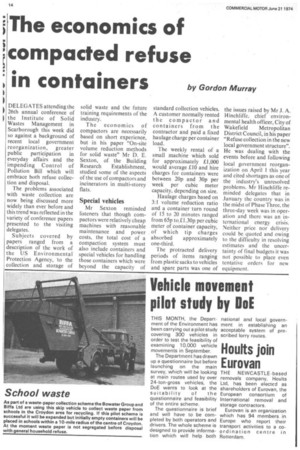The economics of compacted refuse in containers
Page 16

If you've noticed an error in this article please click here to report it so we can fix it.
by Gordon Murray
DELEGATES attending the 26th annual conference of the Institute of Solid Wastes Management in Scarborough this week did so against a background of recent local government reorganization, greater public participation in everyday affairs and the impending Control of Pollution Bill which will embrace both refuse collection and disposal.
The problems associated with waste collection are now being discussed more widely than ever before and this trend was reflected in the variety of conference papers presented to the visiting delegates.
Subjects covered by papers ranged from a description of the work of the US Environmental Protection Agency, to the collection and storage of solid waste and the future training requirements of the industry.
The economics of compactors are necessarily based on short experience, but in his paper `.`On-site volume reduction methods for solid waste" Mr D. E. Sexton, of the Building Research Establishment, studied some of the aspects of the use of compactors and incinerators in multi-storey flats.
Special vehicles
Mr Sexton reminded listeners that though compactors were relatively cheap machines with reasonable maintenance and power costs, the total cost of a compaction system must also include containers and special vehicles for handling those containers which were beyond the capacity of standard collection vehicles. A customer normally rented the compactor and containers from the contractor and paid a fixed haulage charge per container load.
The weekly rental of a small machine which sold for approximately £1,000 would average £10 and hire charges for containers were between 20p and 30p per week per cubic meter capacity, depending on size.
Haulage charges based on 3:1 volume reduction ratio and a container turn round of 15 to 20 minutes ranged from 65p to .£1.30p per cubic meter of container capacity, of which tip charges absorbed approximately one-third.
The protracted delivery periods of items ranging from plastic sacks to vehicles and spare parts was one of the issues raised by Mr J. A. Hinchliffe, chief environmental health officer, City of Wakefield Metropolitan District Council, in his paper "Refuse collection in the new local government structure". He was dealing with the events before and following local government reorganization on April 1 this year and cited shortages as one of the industry's unresolved problems. Mr Hinchliffe reminded delegates that in January the country was in the midst of Phase Three, the three-day week was in operation and there was an international energy crisis. Neither price nor delivery could be quoted and owing to the difficulty in resolving estimates and the uncertainty of final budgets it was not possible to place even tentative orders for new equipment.








































































































